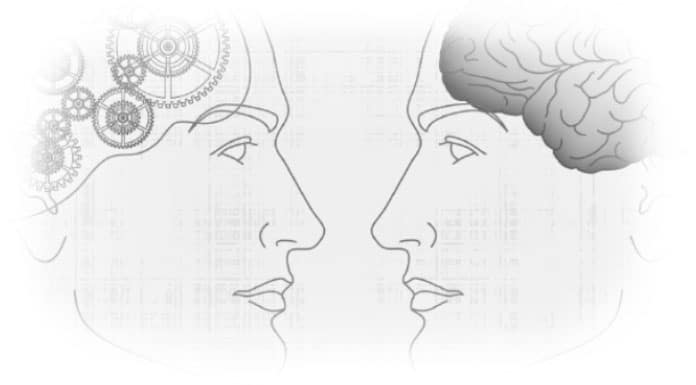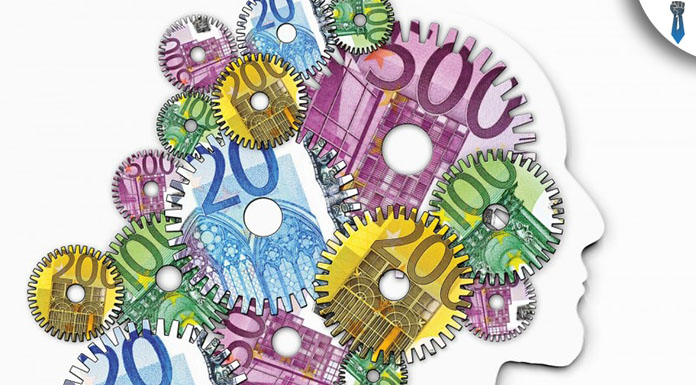Table of Contents
How and when did religion start?
The Human Evolution in under 1,000 words Wisdom Box
First forms of religion
Religion and modern society
Characteristics of non-religious people
Religious beliefs and IQ
Non-religious people tend to earn more money
Religion and cognitive style
Religion and education
My problem with religion
Entering evolution
Charles Darwin and the Theory on Natural Selection Wisdom Box
More arguments in favor of evolution
Why can’t we “see” evolution?
The future looks promising
What am I?
“If you put your tooth under your pillow, the good tooth fairy will visit you while you’re sleeping, and she will replace it with a few coins.”
A fairytale you might say?
Well, I’m not sure about it. There’s a lot of people who seem to believe it’s true. But is it really? What defines whether something exists or not? What separates fiction from non-fiction? Natural and supernatural? Earthly or Heavenly? Fiction, fantasy, fairytales, and religion are all products of human imagination that have very sound evolutionary reasons to exist.
Through today’s post, I will try to uncover everything about religion (and fictional stories in general). I’ll try to explain in simple words, how and when religion started, what causes it serves, and what impact it has in societies around the globe. I’ll also try to explain why it’s bad to believe blindly and the most beneficial way (for you) to look into things.
To be fair, with respect to each religion, let me clarify at this point, that I’m really an atheist. Or am I? More on that term later on. So in this post, I’m not going to go into the specifics of each religion, but to explain how irrational it is to base your whole belief system on an elaborate story. [modern_footnote]There are twelve classical world religions—those religions most often included in the history of world religion surveys and studied in world religions classes: Baha’i, Buddhism, Christianity, Confucianism, Hinduism, Islam, Jainism, Judaism, Shinto, Sikhism, Taoism, and Zoroastrianism. All equally fictional.[/modern_footnote]
In this post, I will try to backup everything I say with the most accurate and up to date evidence and sources I can find. Not every word is backed up because that would need months to be done and it would miss the point entirely. I tried to find the best sources I could, mostly on the controversial aspects of my post. For example, you won’t find sources that prove that unicorns don’t exist. If I need to establish that scientifically, then I’d suggest you skip this post.
But first things first.
How many “believers” are there?
From a study conducted in 2012, 84% of the global population is into some religion. Out of 6.9 billion people who lived on earth in 2010, 5.8 billion were religiously affiliated adults and children.
For statistical reasons only, I’ll break down their percentages, together with a few more statistics:
- 2.2 billion Christians (32 percent of the world’s population).
- 1.6 billion Muslims (23 percent).
- 1 billion Hindus (15 percent).
- 500 million Buddhists (7 percent).
- 400 million people (6 percent) practicing various folk or traditional religions, including African traditional religions, Chinese folk religions, American Indian religions and Australian aboriginal religions.
There are 14 million Jews, and an estimated 58 million people — slightly less than 1 percent of the global population – belong to other religions, including the Baha’i faith, Jainism, Sikhism, Shintoism, Taoism, Tenrikyo, Wicca, and Zoroastrianism, “to mention just a few.”
About half of all Christians in the world are Catholic, 37 percent are part of the Protestant tradition, 12 percent are Orthodox Greek or Russian.
The largest population of Christians (243 million) is found, in the United States, followed by Brazil, Mexico, Russia, the Philippines, Nigeria, and China.
If you’re really into statistics, you can find the entire study here.
Eighty-four percent of the people are into some religion. That’s almost nine out of ten people alive – dead are a completely different story. So the following thought comes naturally to my mind. “Damn it, that’s too many people to be wrong.” Maybe after all the whole God thingy may have some foundation.
So to see how the whole thing started, I had to go back in time. I had to discover where it originated from and how we ended up today in 2017, with almost 90% of people to believe in some supernatural force. I had to dig deep with the best time-machine ever discovered. Google.
How and when did religion start?
There are many possible explanations about when “religious beliefs” started, but according to my research, one theory explains the whole thing the best. But before we dive into the theory let’s see a few background story about our species and how it evolved through time.
It’s important to know all the details and how religion is connected to our evolution, but if evolutionary anthropology ain’t your cup of tea, feel free to skip this wisdom box.
The Human Evolution in under 1,000 words Wisdom Box
*1 Ma = One million years ago
*1 ka = One thousand years ago
Australopithecus afarensis (3.9 Ma – 2.9 Ma)
The first form of Hominidae (great apes) walked the earth around 15 million years ago. But we’ll start our mini analysis from about 3.6 million years ago and the species Australopithecus afarensis who is the first hominid providing substantial evidence of full-time bipedalism. [modern_footnote]Just a fancy word to say walking upright solely on two feet.[/modern_footnote] Australopithecus afarensis lived between 3.9 and 2.9 million years ago and is considered one of the earliest hominins – those species that developed and comprised the lineage of Homo’s closest relatives after the split from the line of the chimpanzees.
A. afarensis had a relatively small brain size (380-430 cm3) and a prognathic (i.e. projecting anteriorly) face.
They were found in savannah environments. From scavenging opportunities, they developed their diet to include meat. Further analyses of Australopithecus africanus lower vertebrae suggests that these bones changed in females to support bipedalism even during pregnancy.
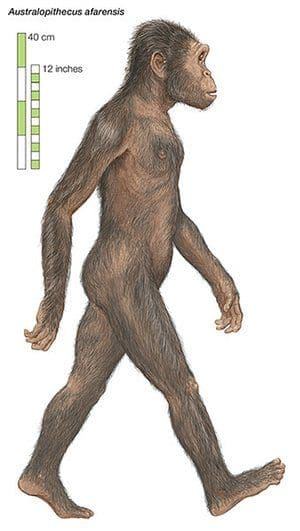
Lucy [modern_footnote]”Lucy” acquired her name from the song “Lucy in the Sky with Diamonds” by the Beatles, which was played loudly and repeatedly in the expedition camp all evening after the excavation team’s first day of work on the recovery site. After public announcement of the discovery, Lucy captured much public interest, becoming a household name at the time.[/modern_footnote] is the common name of AL 288-1, the most famous fossil female skeleton we’ve got from Australopithecus afarensis. Lucy was discovered in 1974, in Africa, Ethiopia. The skeleton is dated to about 3.2 million years ago.
Homo habilis (2.4 Ma – 1.4 Ma)
Through further evolutionary events, the first Homo species appears in East Africa at about 2.8 Ma. Together with Homo habilis, the first sophisticated stone tools make their appearance and mark the beginning of Lower Paleolithic period.
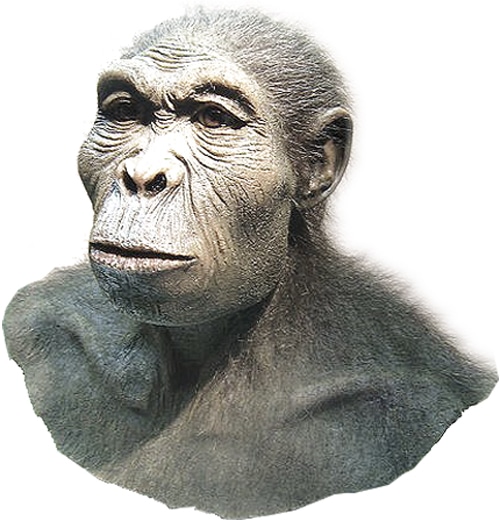
Homo habilis, although different in anatomy and physiology, is considered to be the ancestor of Homo ergaster (working man), or African Homo erectus (upright man).
Homo erectus (1.8 Ma)
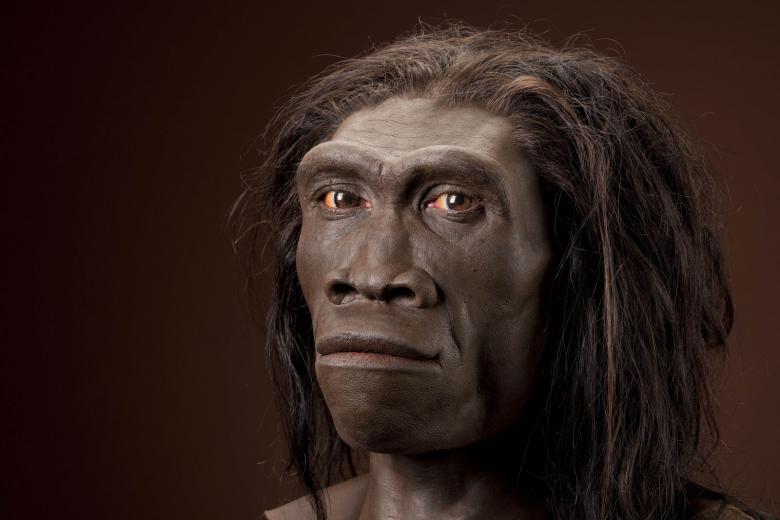
Homo erectus evolves in Africa (what a surprise), and would bear a striking resemblance to modern humans. The major difference is that it has a brain size only 74 percent of the size of our brain. Its forehead is less sloping than that of Homo habilis, and the teeth are smaller.
Homo ergaster (1.8 Ma)
Homo ergaster is the non-african species of Homo erectus, and the first Homo species to control the fire, about 1.5 Ma. Ergaster reaches a height of around 1.9 m (6.2 ft.), with dark skin, which is linked to the loss of human body hair, completed by 1.2 Ma.
Controlling the fire for the first time, had a profound effect on human evolution. Most people believe that fire was so significant because it allowed hominids to cook their food, defend themselves and because it enabled them to see and function somehow better during the night. Although all these are very true, the most indirect effect of fire was this one. Through its many uses, it allowed people for the first time in history to be more relaxed. Being able to defend against predators and see through the darkness, the fire allowed H. ergaster to be more comfortable and get out of a constant fight or flight mode.

This “invention” alone, helped people to grow their brain way more than any other discovery ever made. None can predict how the world would look today, should we have not tamed fire.
Homo heidelbergensis (700 ka – 200 ka)
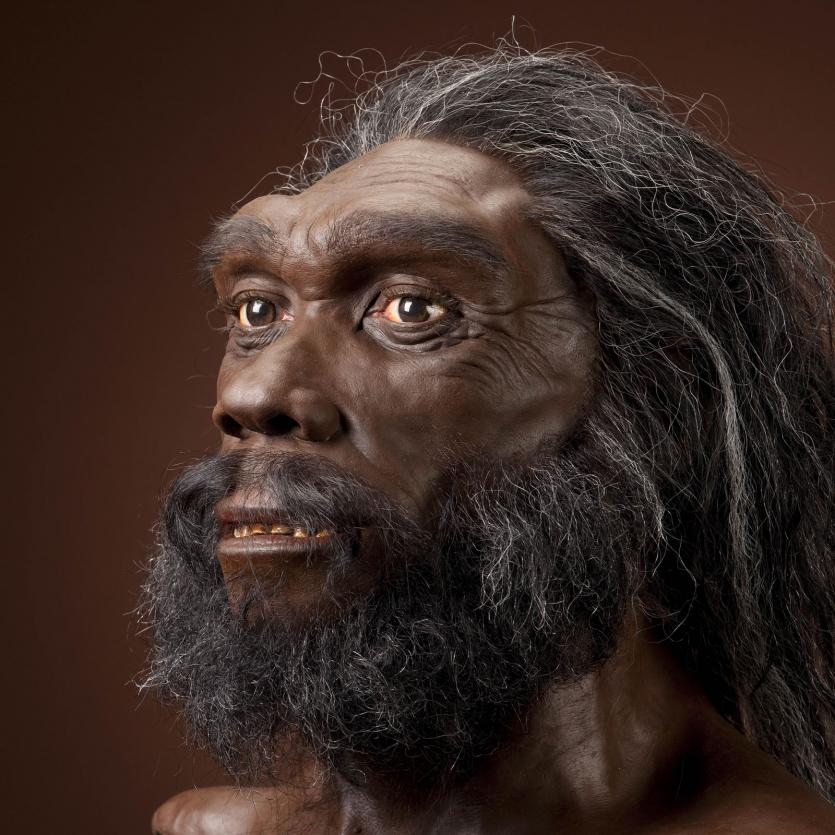
Our next evolutionary step comes with Homo heidelbergensis, a common ancestor of humans and Neanderthals. It is morphologically very similar to Homo erectus, but Homo heidelbergensis had a larger braincase, about 93 percent the size of that of Homo sapiens.
Homo neanderthalensis (400 ka – 40 ka)
At around 500 ka, we have the divergence of Neanderthal and Denisovan lineages from a common ancestor.
Neanderthal or Homo neanderthalensis, (named after the Neanderthal region in Germany) were a species in the genus Homo that went extinct about 40,000 years ago. Neanderthals and modern humans share 99.7% of their DNA and are closely related. [modern_footnote]By comparison, both modern humans and Neanderthals share 98.8% of their DNA with their closest non-human living relatives, the chimpanzees.[/modern_footnote]
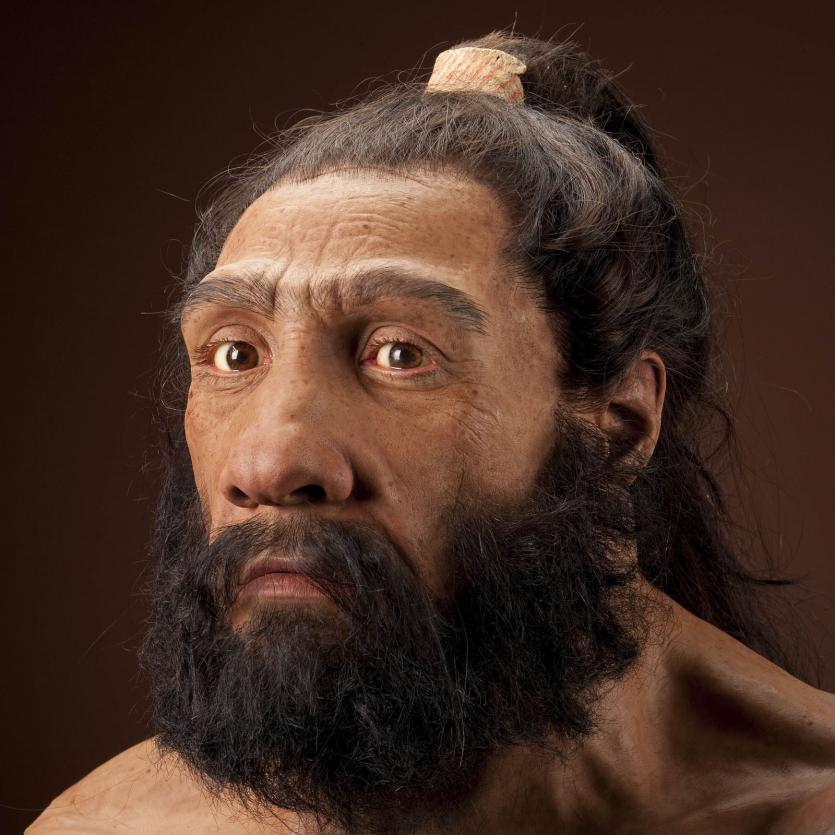
Compared to modern humans, Neanderthals had shorter legs and a bigger body, as an energy loss reduction adaptation to life in high-latitude (damn cold climate). Neanderthals had a cranial capacity averaging 1,600 cm3 for men and 1,300 cm3 for women, which is notably larger than the 1,250 cm3 to 1,400cm3 which is typical for modern humans.
Homo sapiens (~200 ka – today) aka you and me
The first forms of modern human appear at about 200,000 years ago. The oldest fossil of anatomically modern humans are the Omo remains found in modern-day East Africa, and date to 195,000 years ago. They include two partial skulls as well as arm, leg, foot and pelvis bones.
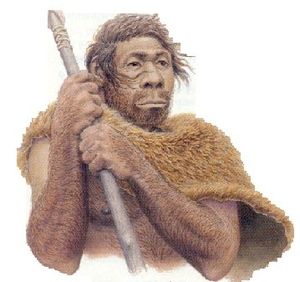
One of the most prevailing theories the theory of Behavioral Modernity, suggests that around 80,000 to 50,000 years ago, human species went into its final evolutionary phase. Although there’s some contradiction, most scholars agree that this was the phase we first started developing abstract thinking, symbolic behavior, [modern_footnote]Another fancy word for art, ornamentation, music, etc. This was when the ancestor of Picasso was born.[/modern_footnote] planning depth, blade technology, exploitation of large game, and many others.
Something that’s not debatable is that if a Homo sapiens sapiens newborn baby from back then, could time travel to 2017, it would look exactly the same as a typical modern baby – all sweet and fluffy.
Although, Homo sapiens is the most advanced hominid by far, nonetheless, it’s not the longest living since we’re only about 200k years old. Many more species have outlived us, and we still got a long way to match their longevity.
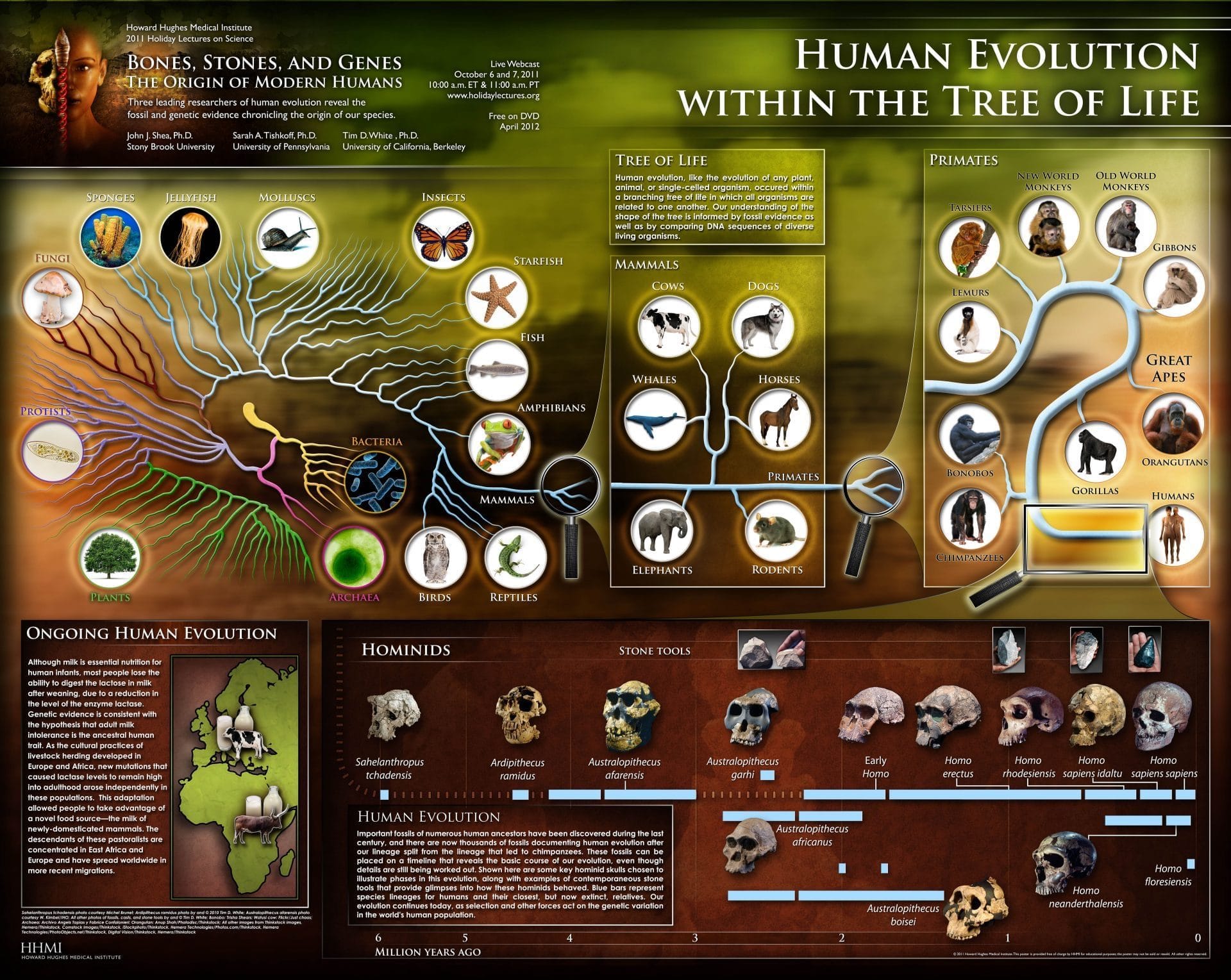
That’s how human evolution looks like in a single graph.
Okay, that was a mouthful. The whole human evolution in under 1k words. A total success from my part. I bet you feel a lot wiser now.
But what the hell does all this stuff has to do with merciful God and religion?
Well, it has everything to do. I’m not sure if you noticed, the last phrase of the previous bad ass wisdom box. But it reads:
The theory of Behavioral Modernity, suggests that around 80,000 to 50,000 years ago, human species went into its final evolutionary phase. Most scholars agree that this was the phase we first started developing abstract thinking, symbolic behavior, planning depth, blade technology, exploitation of large game, and many others.
What this means in simple words is that these humans were the first (together with their contemporary Neanderthals), that had the ability of abstract thinking, meaning they could imagine in the future, think ahead, make plans, foresee things.
This was a HUGE step forward from previous Homo species. It gave humans the ability to adapt better, to be more proactive and to estimate what was going to happen in the future.
But this “new” capability gave birth to a new need. If people could foresee things, they’d also start to wonder what’s next. What happens after someone dies? They become ethereals? They fly up to the sky? They grow wings and turn into angels? Or they just rot becoming a worm delicacy?
Ugh. That last one wasn’t cool at all.
So instead God said, “Let there be light”; and there was light.
The reason spirituality need was initially born, couldn’t get any simpler than that actually.
Luckily this isn’t a matter of opinion. There are countless sources like this one and this one, proving this point, and many more others linked throughout this post. And for all of you that you’re more inclined into learning the truth, there are tons of evidence scattered throughout the Internet supporting these facts.
First forms of religion
Graves from western Asia and Europe strongly indicate that the Neanderthals were the first hominids to bury their dead, as long as 50,000 years ago. In some cases, the dead were buried together with a piece of metal, bones, flowers or in some cases with tools and weaponry indicating their belief for some kind of an afterlife. In most cases, corpses were buried in the fetal position (meaning with legs and hands closest to the chest). Many think this resembles a ritual position, preceding a rebirth.
There’s also evidence that many Neanderthals were buried together with their families; another strong indication of their spiritual needs. These burial pits were some kind of the early Mausoleums and Tombs built thousands of years later in various places in the world.
So the evidence shows that maybe the Neanderthals had some preoccupation with death. They were most probably the first conscious beings and with that came the awareness of death and also its deeper meaning and implications. That kind of awareness had religion, God, and the afterlife as its major byproduct. People who were striving to feel better, happier and more secure, created the idea of an afterlife. Now, when somebody died, he wasn’t considered soil fertilizer, but something more spiritual, a spirit, an angel, or something “purer.”
There’s strong supportive evidence that Neanderthals were the first humanoids with a similar way of life to ours only a lot simpler. They also had a culture, planning abilities and a ritualistic type of life.
Some other researchers suggest an entirely different theory about burials. They believe Neanderthals were a lot more practical than spiritual. They support the idea, that Neanderthals buried the corpses in order not to attract hungry predators (like animals do all the time), or simply for hygiene reasons and protection from rotten bodies. They also present strong reasoning about the burial position, supporting the notion that fetal position is the one taking the less space, therefore requiring the less digging (effort).
Whether they were the first or not to develop a spiritual need, all evidence suggests the idea that somewhere around this time, the first primitive forms of religion started to emerge. And it was after Homo sapiens’ unique skill of language that these ideas caught like wildfire.
Religion and modern society
So how come all modern societies have religions? What’s so special about them? And why did they prevail?
These questions can be explained by various theories. One of my favorite suggests this. Man’s number one priority under any circumstances is to survive in order to reproduce. Death is the worst thing that can happen to us from a biological point of view. It’s so embedded in our brain that we’d do anything we can to avoid it. So at some point, as we became smart enough we had to develop a mechanism that would override this unfortunate, yet inevitable outcome. No matter how we translate them (God, Buddha, Zeus, etc.), religions are here to satisfy this basic need. They make us all feel comfortable about dying. Since we cannot escape death (at least for now), we rely on other techniques to come around it.
Think of it as the “easy solution.” The answer to everything. At least to all these things we cannot easily answer. God provided us the easy, straightforward answer for all the things we could not explain with a *reason* for thousands of years. Dreams, flashes of lightning, illnesses, thunderstorms, plagues, and all sorts of physical phenomenon, now had their answer. How brilliant is this?
Believing in something superior, something that possesses all the power, was super convenient for almost everyone. Now when somebody’s child had cancer, or his father had a stroke, or his house was demolished by a tornado, all he had to do was pray to God. Convenient right? So the development of religion was such a radical and necessary solution that worked like a charm. Taking advantage of various vulnerabilities, we have as human beings, like fear of the unknown, laziness, outer-reference emotions, etc. thrived for tens of thousands of years completely unobstructed.
In the process, religion also left behind countless bodies, and people who still live in the darkness, but I’ll analyze these things later in the article.
On the other hand, I cannot also ignore the beneficial aspects of religion. Believing in some sort of god is proven as one of the best techniques to manipulate the masses into staying united and focused on something. God is what keeps many families together, many people from killing themselves and many more others from serious depression and self-destruction. Religion as a whole also gave many societies the uniformity they present today, a common cornerstone of belief and a centralized source of hope.
I’d be naive not to think religion has also beneficial aspects. Evidently, if religion didn’t work, it’d have perished many years ago. But facts suggest otherwise. Although declining (more on that later on), religion stayed strong for many millennials. Ironically, this suggests an evolutionarily stable strategy (ESS for short) originally introduced by John Maynard Smith and George R. Price in 1973 [modern_footnote]An evolutionarily stable strategy is a strategy which, if adopted by a population in a given environment, cannot be invaded by any alternative strategy that is initially rare. It is relevant in game theory, behavioral ecology, and evolutionary psychology. An ESS is an equilibrium refinement of the Nash equilibrium. It is a Nash equilibrium that is “evolutionarily” stable: once it is fixed in a population, natural selection alone is sufficient to prevent alternative (mutant) strategies from invading successfully. The theory is not intended to deal with the possibility of gross external changes to the environment that bring new selective forces to bear. First published as a specific term in the 1972 book by John Maynard Smith, the ESS is widely used in behavioral ecology and economics, and has been used in anthropology, evolutionary psychology, philosophy, and political science.[/modern_footnote]. In simpler words, this means that if religion as a whole weren’t on average beneficial for our society, it would have perished.
Okay, since religion is helpful nonetheless, what’s the problem having it around?
Nothing except for the fact that’s it’s fake and dangerous.
Characteristics of non-religious people
Trying to explain which other reasons might affect religious beliefs, I stumbled upon some fascinating sources. It appears that besides our innate belief mechanisms, many other environmental factors which play a significant role on how our beliefs are shaped. Many different kinds of studies have been conducted linking religious beliefs and various other indexes like IQ, cognitive capabilities, emotional intelligence, and education. Let’s take a closer look at them; you might be surprised.
Religious beliefs and IQ
As you can assume, such comparisons and correlations are often times difficult to prove, nonetheless, correlations are still there.
In a 2013 meta-analysis of 63 studies, conducted by Professor Miron Zuckerman, a correlation R of -.20 to -.25 (mean r=-.24) between IQ and religiosity was shown. [modern_footnote]If you’re as dumb as me about correlation coefficient R here’s a starter article for dummies explaining the whole thing. It’ll work wonders if you wanna appear super smart to your colleagues in the office tomorrow. [/modern_footnote] Although this coefficient isn’t very strong, it’s enough to at least support some negative coefficient between religiosity and IQ. The meta-analysis focused on three possible explanations: First of all, intelligent people are less likely to conform and thus are more likely to resist religious dogma. Secondly, intelligent people tend to adopt an analytic (and non-intuitive) style of thinking, which had been shown to undermine religious beliefs. Finally, intelligent people may have less need for religious practices and beliefs, as some of the functions of religiosity can be satisfied by intelligence instead.
In another study, researcher Helmuth Nyborg and Richard Lynn, professor of psychology at the University of Ulster, also compared belief in God and IQs. Using data from a vast study of 6,825 adults, conducted in the U.S., researchers found that the average IQ of non-atheists were 6 points lower than that of atheists. Professors reported a correlation of .60 between the level of intelligence and atheism rates, which was determined to be statistically significant.
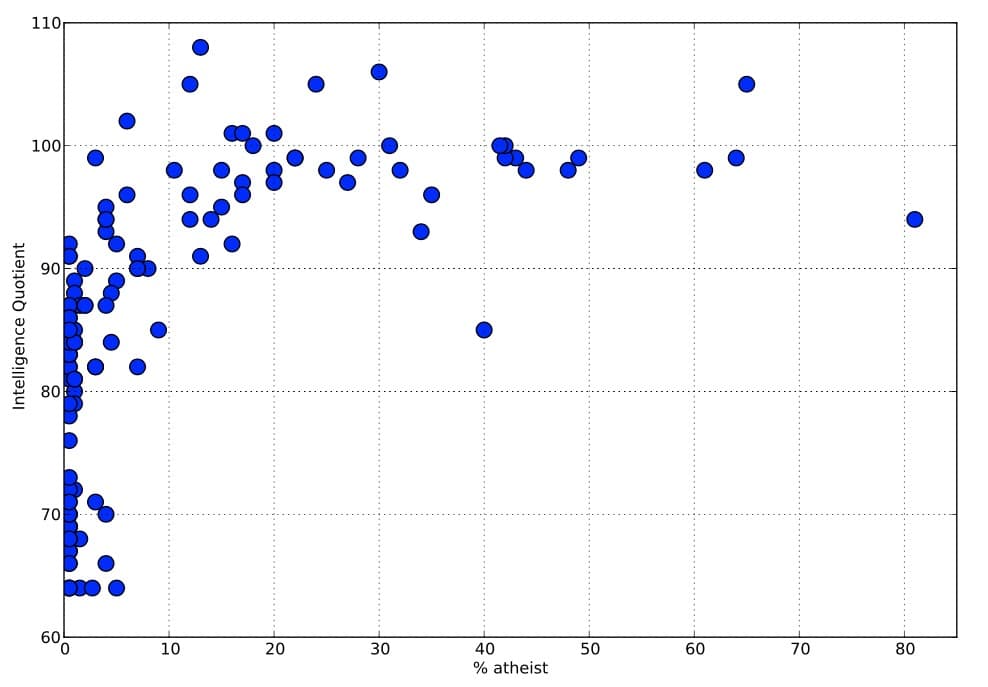
Non-religious people tend to earn more money
Professor Gordon Lynch, from London’s Birkbeck College, expressed his concern that the study of Lynn and Nyborg, failed to take into account a complex range of historical, economic and social factors, which has been shown to have a significant impact on religion and IQ in different ways. For example, a Gallup survey, have found that the world’s richest countries are consistently the less religious, perhaps because religion plays a less functional role (helping people cope) in wealthier nations.
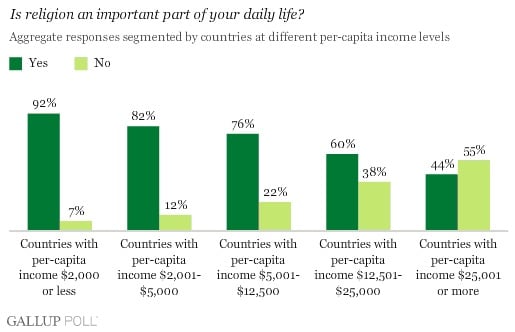
Also, other strong correlations between national IQs and other factors are available. Lynn and Vanhanen claimed that national IQs are correlated with per capita income at a correlation of .73. However, when long GDP (1975 – 2003) were used, the correlations increased to .82 for 81 nations. Further study confirmed the results for 185 countries (r =.65) and another for 152 countries (r =.76)
Religion and cognitive style
Many neurological studies on belief and nonbelief mechanisms have shown that there’s no difference, from the brain point of view, between theistic belief or atheistic belief. This stands true even when nonbelievers and believers accepted and rejected completely conflicting statements. In both Christians and atheists the same neural networks were active when dealing with “blasphemous statements.” Furthermore, evidence suggests that “intuition” and “reason” are not two segregated and separate activities but are intertwined in both theists and atheists when they come to any personal conclusion.
My general consensus throughout my research while writing this post is this. People can be separated into a broad spectrum of how “intuitively” or “analytically” they tend to think. This spectrum (like every other spectrum) can significantly vary from people who only take intuitive, irrational decisions all the time, to the ones who tend to analyze things, look for logical explanations based on reasoning and then make up their minds on something. And of course all stages in between. So my understanding based on many studies like this one is that the more reflectively and analytically an individual tends to think, the less likely it is to believe in God.
And this only makes perfect sense, since hardware-wise most people have the same brain power capacity. It is how we use this brain to draw every conclusion. When a theist concludes, I read it in the holy bible, so it must be true, someone with reflective thinking will use the method of research and cross-check before he comes to a decision about something.
Religion and education
Before I even start researching on this subject I had the empirical impression that religion and education had nothing to do with each other. In other words, my experience so far suggested that someone can be religious or not, irrelevantly from his or her educational background. i.e. more schooling doesn’t mean more or less religiosity.
And I was more or less right about it. Most studies conducted, fail to show a correlation between average years of schooling and level of theism. For example in a 2016 Pew Center global study on religion and education, Jews ranked as the most educated (13.4 years of schooling) followed by Christians (9.3 years of schooling). In third place (with 8.8 years of schooling) ranked the religiously unaffiliated like atheists, agnostics and those who describe their religion as “nothing in particular.”
Again, the whole point makes sense to me. Unless things have dramatically changed since the last time I stepped foot into a classroom, teachers in schools, teach anything but reasoning. Even in science classes, there’s hardly any evidence of teaching kids how to think rationally based on reason and evidence. Therefore, more school does not equal more reasoning. It’s totally unrelated to the level of religious beliefs. Someone could have two MSC and three Ph.D. diplomas and still believe that this world was created 6,000 years ago by a SUPER-wise grandpa with a white beard. [modern_footnote]In six days.[/modern_footnote]
My problem with religion
So what’s my issue with religion? Why the hell, have I invested more than 21 hours into writing a piece that tries to convince people not to believe in God?
Well, actually this is not my scope here. My intention with this long article isn’t to make you an atheist. At least not directly. My goal after writing this post is to make you think. My biggest issue with religion and God is that treats people like children. [modern_footnote]Actually the first big problem with religion, in general, is that across the centuries, there have been numerous, vast in scale genocides in the “name of God.” While religion isn’t the only reason for massive criminal activities in the last centuries, it is for sure one of the most important ones. When I say religious crimes, you can include here all the following categories: mass suicides, witch hunting, bombing people, terrorism, etc. Here’s a very compact list of the top ten atrocities committed in the name of religion.[/modern_footnote] Instead of pushing them to mentally grow, religion assumes all answers. Everything is pre-written in the holy bible. No more questions are left.
People are here today at their pinnacle of advancement exactly because of what I’m standing for in this post. Reasoning, exploration, seeking answers to the everyday phenomenon. Luckily there have been many people who wanted to seek the real truth. Not a religious group’s, man-made truth. The actual, undeniable and scientifically sound truth. The one Darwin devoted all his life to prove kind of truth.
The fundamental difference between humans and animals is the reasoning. We were lucky enough to develop a large enough neocortex so that we could become aware and use our reasoning to progress more and more. Unfortunately, what religion is doing to you, is nullifying this ability of yours to question things and instead, giving you canned answers to everything.
That is the worst thing about religion, and that’s what really infuriates me when I think that all age brackets are sensitive and defenseless to this kind of (non) thinking. But most of all, children. Children have this fantastic ability when they’re born to question everything and constantly seek answers about the environment. Our internal systems generally work fine. Nature has developed us the way we were supposed to be. But unfortunately many times things go terribly wrong. Think of this example. Try to remember how many questions ask children in their first years every day? Then think again how much this questioning of everything is reduced over the years.
Unfortunately, the fact that we people stop asking questions is one of the worst things that can happen to us. You know why? Because no matter if we know the correct answer or not, we are going to explain natural phenomenon anyways. But most times with faulty reasoning that has catastrophic consequences. Let me illustrate with an example that will make my point very clear.
Scenario 1, religious approach.
Somebody’s dad is living an average life, eating junk food, having no exercise, smoking, drinking, etc. Depending on his body tolerance and genes, he might pass by like that for a few years. Regardless of his genes though, sooner or later his body will start to deteriorate. It’s very probable that after being 40 or 50 years old, he will have a problem with his heart, lungs, arteries, etc. A very likely scenario is that at some point he will have a heart attack or a stroke and he will die.
If you fall into the religious people category you would most probably explain this outcome as follows:
It was God’s will. God gives, and God takes. If it’s a God will he will make it, etc.
Scenario 2, reasonable approach.
Somebody is aware of how the human body works because she has studied a few things about it. She’s not a doctor, but she has the basic understanding of what’s good and what’s bad for her body. She lives healthily, works out often, eats clean natural foods and has done all that’s needed to lower her stress levels. Most probably she lives a life much better, full of health and energy and at some point, the body naturally fails and she dies. The odds are that she had outlived the person from scenario 1, and not only that but her last years were of much higher quality.
So the fundamental difference between these two individuals is that one put all his hopes on God, and the other one took all the necessary actions to help herself live a longer and better life. Person number one didn’t want any responsibility or awareness, and person number two took all liability. She learned how things work, what she had to do to accomplish her goal and she took action.
The above is only a random example I notice in my everyday life. But the same logic applies in every aspect of our lives. Health, wealth, and relationships. Being aware and reasonable is hard I get it. It’s hard because it pushes us to assume responsibility. And who wants to be responsible for his actions or lack of them? Well, as it turns out, very few people.
Entering evolution
Okay, if God didn’t create the earth and stars in 6 days, then who did?
Well, not someone in particular. It happened over time.
Like I said, for thousands of years people believed in gods, angels, ghosts, etc. Most of them still do, but luckily, evolution and technology started to put an end to this madness.
No matter how weird it sounds, all people believed in the supernatural, for many years. It was catholicly accepted [modern_footnote]See what I did there?[/modern_footnote] until 1859 when Charles Darwin published his theory of evolution, presenting compelling evidence in his book On the Origin of Species.
By the 1870s, the scientific community and much of the general public started to accept evolution as a fact. However, it wasn’t until making a case for to 1950s and the emergence of modern evolutionary theory, that a broad consensus formed in which natural selection, was the primary mechanism of evolution.
Charles Darwin and the Theory on Natural Selection Wisdom Box
Charles Robert Darwin (12 February 1809 – 19 April 1882), was an English biologist, naturalist and geologist, know for his contributions to the science of evolution. He made known that all species of life have descended over time from common ancestors. He first introduced his scientific theory that this branching pattern of evolution resulted from a process that he called, in which the struggle for existence has a similar effect to the artificial selection involved in selective breeding.
Like breeders put together two somehow different kinds of pigeons to achieve “better” colorization or more elongated feathers, nature operates similarly. The main difference is that nature doesn’t have a particular outcome in mind as breeders do. Nature’s only goal is the survival of the species through specific mutations over time.
Darwin’s love of nature made him neglect the medical school; instead, he helped to investigate marine invertebrates. His five-year voyage on HMS Beagle established him as a prominent geologist and made him a popular author.
Puzzled by the geographical distribution of wildlife and fossils he collected through his voyage, Darwin began investigating, and in 1838 he devised his theory of natural selection. He was writing his theory in 1958 when Alfred Wallace contacted him with an essay presenting the same idea, urging for immediate publication of both their theories. Darwin’s work established evolutionary descent with modification as the dominant scientific explanation of diversification in nature. In 1871 he examined the human evolution and sexual selection in The Descent of Man, and Selection in Relation to Sex, followed shortly after by The Expression of the Emotions in Man and Animals in 1872.
Darwin has been described as one of the most influential personalities in human history, and he was honored by burial in Westminster Abbey.
Without getting into much detail on my part; through a number of brilliant observations, like farmers picking the best stock in selective breeding, slight variations of the same animal, and his extensive research on a variety of finches and other birds he made up his basic framework of his theory of natural selection. His research included a vast amount of experimental selective breeding of animals and plants, finding evidence that species are not fixed and investigating many detailed ideas to refine and substantiate his theory.
On the Origin of Species was a wild success. All of the 1,250 copies were exhausted when it went on sale to booksellers on 22 November 1859. In the book, Darwin made a long argument of inferences, detailed observations, and consideration of anticipated objections. In making the case for common descent, he included evidence of homologies between humans and other mammals. He outlined sexual selection and suggested that it could explain differences between human races.
He implied the significance of his work with the sentence; “Light will be thrown on the origin of man and his history.” His theory is stated very simply in his introduction:
As many more individuals of each species are born than can possibly survive; and as, consequently, there is a frequently recurring struggle for existence, it follows that any being, if it vary however slightly in any manner profitable to itself, under the complex and sometimes varying conditions of life, will have a better chance of surviving, and thus be naturally selected. From the strong principle of inheritance, any selected variety will tend to propagate its new and modified form.
At the end of the book, he concluded that:
There is grandeur in this view of life, with its several powers, having been originally breathed into a few forms or into one; and that, whilst this planet has gone cycling on according to the fixed law of gravity, from so simple a beginning endless forms most beautiful and most wonderful have been, and are being, evolved.
By the time of his death, Darwin had convinced most scientists that evolution as descent through modification was accurate, and he was considered, as a great scientist who has revolutionized ideas. He was honored by more than 400 officials and experts from across the world for the fiftieth anniversary of On Origin of Species. At the beginning of the 20th century, various scientists proposed alternative theories, which eventually proved untenable. Ronald Fisher, an English statistician, finally united Mendelian genetics with natural selection. He gave the theory a mathematical footing and brought a broad scientific agreement that natural selection was the basic mechanism of evolution. [modern_footnote]There is an excellent documentary analyzing many of the concepts mentioned above called: The Genius of Charles Darwin. I’d highly recommend watching it after you’re done reading my epic rant here.[/modern_footnote]
In all honesty, the evidence is everywhere. All someone has to do is open her eyes and see. Endless amounts of fossils in every modern beach you visit can show you with great detail, the various forms and variations of countless marine species for example. Survival and reproductive mechanisms so perfectly in place that could only have evolved through thousands or even millions of years of constant evolution and refining.
More arguments in favor of evolution
Look I get it. It’s super hard for anyone to accept such a radical way of thinking compared to his. Most of us have been told to believe in the supernatural for all our lives. You’ve been told by society, your parents, your friends, and your schools that believing in a god will keep you safe and it will provide you with all goods in life. Each time I think about it, it reminds me of this funny analogy with the elephant.
The first time a new baby elephant is introduced to a circus, it’s initially tied to a wooden post with a thin rope. Initially, the animal is trying to break loose of the rope and the post, but they are strong enough to keep the baby elephant in place. After a few tries, the animal learns to believe it can’t do anything about it. As time passes, the elephant grows big and strong, but it won’t try to remove the post since it learned this way through its younger years. So if you ever come to a circus yard and see a huge elephant tied up to a flimsy rope, you’ll know. The huge proud animal learned to believe that it can’t break the rope when it was young. It created a powerful limiting belief in its mind that stuck forever.
It’s the exact same thing with people as well. And not only about religion. We’ve been told since our childhood to believe in God so he will keep us healthy, strong, wealthy, etc. If you keep hearing the same shit for 20 or 30 years, it becomes such a fat pathway in your brain that it’s tough to overcome.
No matter how many evidence I provide in this post, I acknowledge how deeply rooted this belief is in most people’s mind. I had the same conversation times and again. I analyzed every possible argument I had [modern_footnote]Here’s another good one: I keep hearing that God is all-knowing, wise, etc. He’s also supposed to be very good, noble and with the best of intentions. If that’s the case, I’d really love to know why he designed some of us being inferior to others. What’s his criterion when he makes someone sick or poor? What’s the logic behind a child who’s born with AIDS, blind or deaf? Why are some people smarter or better looking than others? If God designed everything so perfectly why some animals are slower and weaker than others and consequently are getting killed in the jungle? And I don’t mean lions eating gazelles? I mean lions eating the slow gazelles and not the faster ones. If God designed some gazelles to be slower so they can be eaten, what does that tell you about people? That some of us are flawed by design![/modern_footnote], but yet nothing.
Why can’t we “see” evolution?
A few months back, while I was at the gym, a fellow athlete, who also happens to be a priest approached me, and we started to talk. [modern_footnote]Mind you, I really like the guy, he’s super funny and pleasant to speak with.[/modern_footnote] During our little chit chat, he posed me the question. “Do you know what TV and God have in common?” Without thinking about it too much I replied “sure, they both make people think less.” Although he laughed (out of courtesy), he said “no, although, you can’t see television’s signal, it’s there. It’s like God, you can’t see him, but he’s there.”
Priest: 1 – Robert : 0.
During my numerous discussions about evolution, I even tried to shoot down one of the best arguments theists have against evolution: “Since all species have evolved, how come we can’t see this evolution take place? Since I was a little child, penguins look the same. I haven’t noticed them evolving at all.”
Right. First of all let me start by saying that for something to exist, you don’t necessarily have to be able to see (perceive) it with your own eyes, as my fellow priest from the gym put it down very well. For example, atoms and subatomic particles can’t be seen with a naked eye, yet they are very very real. How do we know so? Because we were smart enough to create instruments that can “see,” measure and study such particles. We have been studying them for years, and we can prove their existence through countless scientific experiments.
On the contrary, despite how smart we say we are, we have yet to invent a God-o-meter. A device that will clearly show us the presence of a superior religious force. I suspect that it’s so hard to prove mainly because you can’t prove something that’s not real, in the same sense we cannot prove the existence of unicorns, wizards, the Hulk and so on. But keep your thoughts for now, we’ll revisit this argument in a bit.
As far as the noticeable changes argument is concerned, let me explain as simple as possible.
When Darwin and the scientists talk about the evolution, they refer to a period of a few million years for greater changes to a few hundreds of thousands of years for *smaller* changes to take effect. Our lifespan (~80 years) compared to the almost three million years we exist as species is like trying to observe any noticeable differences in yourself growing up in 18 hours. It’s pointless.
Yet if you go deeper, there are astonishing amounts of evidence suggesting that evolution is a REAL thing. It’s actually taking place for millions of years, and even billions when we talk about our green earth. [modern_footnote]Yes our planet is a very old fart. About 4.6 billion years old to be exact.[/modern_footnote]
There have been countless studies proving times and again, that all species on this earth share at least some percentage of their DNA, suggesting that at some point, every living organism on this earth had a common ancestor.
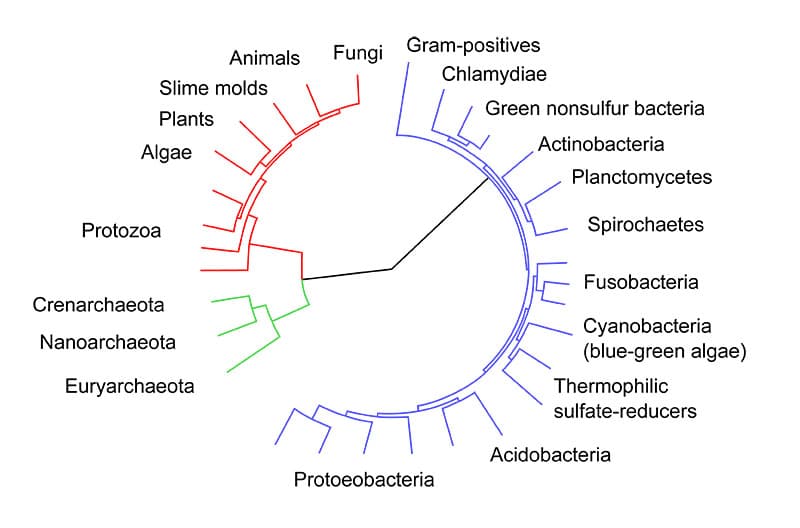
If this can’t get you to believe that we all evolved to our contemporary form, then I don’t know what can.
Unfortunately making people function with reasoning about religious issues is an uphill battle. Like if all else wasn’t enough, theists even afraid that if they admit God’s non-existence, they will get cancer or the plague as a form of punishment for being infidels. So let me ask you this? If the God is so kind and merciful, isn’t he supposed to forgive you about your implied arrogance? You’re only a tiny creature in front of his infinite wisdom after all. I sure wouldn’t punish a three-year-old kid if he called me an asshole.
The future looks promising
Despite the darkness of the last 50,000 years, at last, the humankind shows some tendency into believing something real for a change. Science, Internet and knowledge sharing have played a tremendous role for this turn.
According to this source, in 2013, religiosity hit an all-time low in the last 50 years. The index of the graph below is a combination of various “religious” indicators, like the importance of the church in people’s lives, how frequently they attend, and people who say they are atheists. It doesn’t represent a particular number, but it clearly depicts the overall tendency of U.S people to believe in God, and it’s for the best if you ask me.
My belief is that as time passes more and more people will start looking at the scientific evidence, and the era of blind faith will eventually come to an end. This will be the new ESS. As media’s coverage expands, more and more people will have to face the facts. Ultimately, superstitions and demons will be replaced by sound scientific evidence and data.
A downside I can think of this is that a lot of people will still be hopeless and obliged to face the cold hard truth. They will be exposed to more documentaries, experiments, scientific papers, etc. But due to the fact they’ll still have to face their own problems, they won’t have an easy way out from them. Instead of relying upon the Almighty, they will have actually to face and conquer their problem. Of course, that’s not to say, bring religion back to relief people’s problems. Instead, a more long-term solution would be to educate more people and give them the tools they need to fight for their own future. Entrepreneurship, among others, would be an excellent avenue for someone to become his own master for example.
It’s not a coincidence that the more the Internet spreads, the more the religion declines. People become more aware and educated and less afraid and superstitious. In 1980, Internet use was close to zero, but in 2010, 53 percent of the population, spent at least two hours per week online, and 25 percent surfed for more than seven hours. This increase matches very closely the decrease in religious affiliation. That’s actually a fascinating result.
What Downey has found through his study, is correlations. As any statistician will tell you, correlation does not necessarily mean causation. If A is correlated with B, there can be several possible explanations. A might cause B, B might cause A, or some other factor might cause both A and B. Like in every example before, what one chooses to believe is what defines him. To me, it makes perfect sense, since, for the last almost 30 years, the Internet has been the most profound source of knowledge ever created. Knowledge equals reasoning. Since the last time I checked, reasoning and religion weren’t the best friends.
What am I?
So what the hell am I? Where do I stand? In what I believe? What will happen to my body when I die?
I’ve spent a great deal of time for the last three years learning about human beings. I’ve watched countless hours of documentaries, read books, articles, and watched talks on various topics concerning anthropology. Some of them were in the domain of evolutionary biology, applied psychology, human interaction, emotions, among others.
That’s not to say I’m super educated or a scientist. Not even close. But I invest, about three to four hours almost every day on average, to educate myself on various subjects. That’s roughly 1,000 plus hours per year. The reason behind my obsession with educating myself isn’t to be able to brag in my articles. The reason I invest heavily into self-education is that I want to be aware. [modern_footnote]Ladies also find it super sexy.[/modern_footnote]
I want to know as much as possible about everything. I want to be able to explain with reason whatever happens around me no matter how sad or difficult it might be. I prefer to know what’s the real reason for my trouble instead of blaming a supernatural force because it gives me control to solve the problems and ease my pain.
Since God doesn’t exist, it would be naive to qualify as an atheist. In fact, in my opinion, the very word shouldn’t even exist. Have you ever heard of an a-magicianiast or an an-unicornist? No. That’s because we all know that magicians and unicorns don’t exist – contrary to God’s case, where there’s still some debate about it.
So it’d be better to try to characterize me not in terms of something that doesn’t exist, but rather on something real. Your eyes might hurt by now, but I firmly believe in reasoning. In awareness. In the scientific method. In the facts. In every piece of real data that will help me get control of my own destiny.
I don’t think there’s a proper word for it, but I think there should be one. Maybe I could qualify as an awareness-ist or a reasonist. I know Mao and Stalin were atheists, but I don’t define myself as what I’m not, I define myself as what I am. I am a reasonist.
I know for a fact that when I die, my body will degrade. I know that my soul won’t fly up to the heavens, or be tortured down in hell. Like every other bio-degradable organism, it will be put under the soil, as it happened for millions of years during our evolutionary past for hygiene or safety reasons. I don’t need a smart fairytale with a happy ending to be content. I know what I’m made of, and what will happen to me after my heart stops beating.
I know exactly what my purpose in this life is. The race is survival, the finishing line is reproduction. Thousands of generations before mine did it, and so should I. Live my life the best way I can and leave the best possible offsprings behind me.
We’re incredibly lucky to be born in an era with all this information freely available. It’s a real waste to be stuck in old beliefs just because they were somehow useful in the past. There’s nothing wrong embracing your true human nature. There’s plenty of time to make a tremendous impact in our lifetime on this earth, instead of looking for reasons to be happy in the afterlife. Stop worrying about what will happen next and start working into becoming something spectacular now.
If despite all the facts presented above, you still don’t feel convinced, at least give it a try and start searching about evolution and where do we come from in reality. Just a few minutes of research might be enough to change your life and your belief system forever.
I’ll close by borrowing Neil deGrasse Tyson’s quote from The Poetry of Science when he was asked what he would like to be done with his body if he knew he was to be executed:
“I would request that my body in death be buried, not cremated so that the energy content contained within it gets returned to the earth, so that flora and fauna can dine upon it just as I’ve dined upon flora and fauna throughout my life.”
